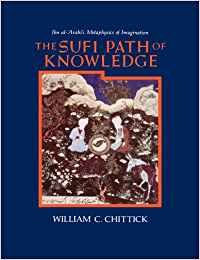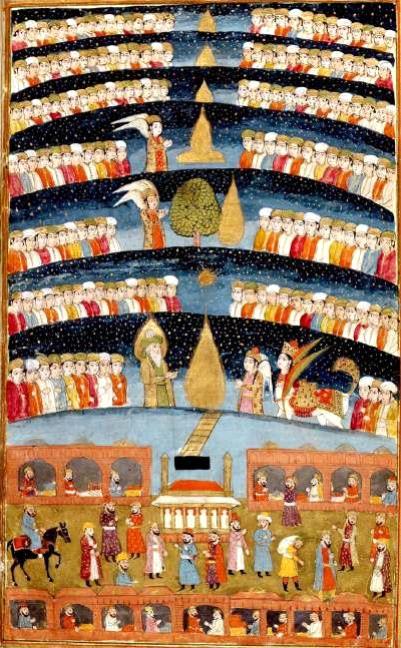Sufism is the way of purifying the heart from bad manners and characteristics under the guidance of a Sheikh.
What is a Sheikh?
A Sheikh is someone who has inherited what the prophets brought and who is authorized to convey these teachings and secrets to those who take his hand as teacher. A true Sheikh is the one that has mastered his lower self’s bad characteristics through devotion and sincerity towards His Lord. For that reason he is able to guide his students to mastery of their own lower selves, opening the way to reach unlimited potential of their spiritual realities.
How does one reach spiritual levels in Sufism?
The main methods of attaining spiritual progress in Sufism are:
1. Following the guidance and instructions of an authorized Sheikh or guide.
2. Performing dhikr, the remembrance of your Lord through reciting his Holy Names and Attributes, glorifying Him and praising the Creator of all.
3. Attending the advice and dhikr gatherings held in the presence of the Sheikh or his representative; sitting together, praying together, welcoming all that come to praise their Lord.
How is Sufism related to Islam?
 It is the path of spirituality that exists in Islam. Its meaning is:
It is the path of spirituality that exists in Islam. Its meaning is:
1. Seeking the pleasure of God
2. Love and peace with one’s self
3. Harmony with all creations (mankind, animals, and nature)
4. To be dressed with the beautiful attributes of Prophets and Saints What does Islam mean?
Islam means submitting to God’s Will and accepting that there is no God but one God and Muhammad is the Messenger of God, peace and blessings upon him, as are Jesus, Moses, Abraham, Noah and Adam, peace be upon them all.
What is faith according to Islam? Faith is believing in:
2. In the existence of spiritual beings known as angels
3. In the revelations of God (the Testaments), the Psalms revealed to David, the Torah sent down to Moses, the New Testament brought to Jesus and the Last Testament, Qur’an brought to Muhammad (peace be upon them all)
4. all the prophets that were sent as mercy to mankind
5. The Judgement Day and Resurrection
6. The Divine Decree (destiny)
How does Islam view other religions?
1. All are vehicles and a path to God’s Divine Presence;
2. According to Islam, all religions are originally from God the Exalted. With time and man’s weakness, most religions were distorted from their original truth and adopted practicing of idolworship or other wrong beliefs, which turned people away from worship and adoration of the one true God.
3. You will find the essence of other religions embodied in the beliefs of Islam. How does one enter Islam?
One enters Islam by believing in one’s heart in the existence of One Lord and believing in Muhammad (peace and blessings upon him) as the last of the Prophets that the Lord has sent throughout history.
Sohbet: companionship in conversation, association
The English language is often inadequate when it comes to describing spiritual states of mind. Sohbet, in Sufism, is a spiritual transaction between teacher and student which relies on ancient oral storytelling traditions and practices. Mystical knowledge and Devotional Love is transmitted during Sohbet in such a way that it attempts to circumvent the knots of the rational mind and connect the hearts of the seekers. Sohbet can be understood as a spiritual dialogue, a cleansing of the soul and a meeting of the hearts. From the metaphysical to the very physical, Sohbets help us reflect on the events of our everyday lives and guide us in our search for a sense of unity and security.
“ Stay close to any sounds that make you glad you are alive.” Hafiz ~
The Sufis say: “There are three ways to relate to the Divine: One is Prayer, a step up from that is Meditation, and a step up from that is Sohbet.”
What Sufi mystics mean by sohbet is difficult to translate in English. Simply put, it means conversation of ‘a totally different nature’. It is conversation between friends of spirit and heart, it is a deep listening and transmission of heart as well. Everything in the created cosmos is also in ceaseless conversation, in endless symbiosis and those with attuned ears of the inner heart are able to listen to them.

True sohbets are so powerful that it can bring a much deeper realization in short space of time, than years of prayers or meditation alone. On meditation being a step up from prayer, Prophet Muhammad said, “One hour’s meditation on the work of the Creator is better than seventy years of The prayer.” The Sufi path values sohbet and thus listening deeply and directly from a sufi master / enlightened one is emphasized on the path. Sohbet carry the powerful seed of what Far Eastern spirituality calls ‘Satori’ or sudden enlightenment. The name and idea ofancient Hindu sacred text the Upanishad is also an idea of ‘sohbet‘ as well. Upanishad means ’sitting down near’ an enlightened spiritual master or guru in order to listen and to receive.
In the Tibetan Buddhist tradition, Milarepa (born, Mila Thöpaga meaning ‘a joy to hear’), the most famous mystic saint of Tibet, yogi, wanderer and much loved poet of eleventh century is often famously depicted with one hand cupped behind his ear. In Buddhist iconography he is as someone who is always listening deeply, symbolizing Milarepa’s deep listening to the great voice of the cosmos, of the inner song of existence.
On the value of listening ‘The Tibetan Book of the Dead’ calls it Great Liberation through Hearing.
Jesus the Annointed One said, “He who has ears to hear, let him hear.” – Mark 4:9
“It is to those who are worthy of (hearing and understanding) my mysteries that I tell my mysteries.” – Christ, The Gospel of Thomas
‘He who has an ear, let him hear what the Spirit says …’ – Revelation 2:7, 3:22
Sohbet is a spiritual conversation from an enlightened soul. In the practice of sohbet, teachings are transmitted from teacher to students through storytelling, presence, and sacred space. A sohbet can encompass the physical and mundane or the metaphysical and sublime.
The Drop and The Ocean
If we liken God to the ocean and the human individual to a drop, we can say that the function of Sufism is to carry the drop to the ocean.
The master of the Path then is like a river linked to the ocean. The drop must commit itself to the river, so that it can be carried to the ocean.
Needless to say, for the drop to reach the ocean with the help of the river, it must first meet many difficult challenges. It must put up with a great deal of turbulence arising from its various encounters in the river, so that it may eventually merge with the ocean in serenity and stability.
In certain circumstances it is possible for the drop to merge directly with the ocean, a process referred to as ‘attraction’. In this case, however, the drop does not have the advantage of being able to guide others, because it has not itself traveled the path of the river.
Given that the river and the ocean are fundamentally one, annihilation in the master is considered to be the same as annihilation in God. Submission to the master means that the master blinds one’s self-seeing eyes, or the ‘drop- consciousness’ of the disciple, and brings sight to one’s God-seeing eyes, or ‘ocean-consciousness’.
Only when the drop has submitted to the river, and ultimately the ocean, can it forget its ‘drop-ness’. When the drop finally merges with the ocean, it sees through the eye of the ocean that it is the ocean.
The drop, of course, must be in contact with the river and the ocean in order to be absorbed in them. The remembrance (dhikr) given to the Sufi by the master is the only means of bringing the disciple into such contact that he or she may be snatched up by their attraction.
If the drop merely settles on the bank of the river or the shore of the ocean, it will lose nothing of its ‘drop-ness’. It must throw itself into the water if it wishes to give up its selfexistence.
This is why Sufism is said to entail ‘becoming’, and not simply hearing or reading.
Only by the light of the Spiritual Path and the mystic way can the Truth be discovered. In order for one to truly witness the Perfection of the Absolute, one must see with one’s inner being, which perceives the whole of Reality. This witnessing happens when one becomes perfect, losing one’s (partial) existence in the Whole. If the Whole is likened to the Ocean, and the part to a drop, the sufi says that witnessing the Ocean with the eye of a drop is impossible. However, when the drop becomes one with the Ocean, it sees the Ocean with the eye of the Ocean
Maulana Sheikh Nazim said:
 Sultan Al-Arifin, Abu Yazid Al-Bistami, once said: “Oh my Lord, You have Power over all things and You have absolute Power to do anything You wish to do; therefore, I am asking You now to make my body so big as to fill the seven Hells, so that no place remains for other people. Every punishment You would give to Your people, pour it on me instead.? Then came the Divine reply: “Oh My servant, are you trying to compete with Me in generosity and mercy whereas I am the Most Merciful of the Merciful (Arham-ur-Rahimeen), the Most Generous of the Generous (Akram-ul-Akrameen)? All your generosity and mercy is only like a drop in an endless ocean compared to My Mercy and Generosity that I am giving out to My servants every minute, and I demand of you no blood sacrifice.”
Sultan Al-Arifin, Abu Yazid Al-Bistami, once said: “Oh my Lord, You have Power over all things and You have absolute Power to do anything You wish to do; therefore, I am asking You now to make my body so big as to fill the seven Hells, so that no place remains for other people. Every punishment You would give to Your people, pour it on me instead.? Then came the Divine reply: “Oh My servant, are you trying to compete with Me in generosity and mercy whereas I am the Most Merciful of the Merciful (Arham-ur-Rahimeen), the Most Generous of the Generous (Akram-ul-Akrameen)? All your generosity and mercy is only like a drop in an endless ocean compared to My Mercy and Generosity that I am giving out to My servants every minute, and I demand of you no blood sacrifice.”
Grandsheikh says: ”whenever I speak on this subject, I am always asking Divine Permission to bring out more and more good tidings of Allah’s endless Mercy and Generosity Now we are giving these good tidings, and if you are not receiving them with welcome, then you are only making yourselves suffer. If there is anyone objecting and saying that there must be eternal Hell, then he may go there. We are trying to pull them into our Lord’s Mercy Oceans, but they intend to put everyone in Hell, and they never think that they themselves will enter it; therefore they are agonized and outraged by our good tidings to the servants of our Lord.”
This masterpiece by Titus Burckhardt examines the essence of Islamic mysticism, or Sufism, presenting its central doctrines and methods to a Western audience in a highly intelligible form. Th is edition contains a new foreword by William C. Chittick and an extensive glossary/index. read here ….
The garden of Truth
The Vision and Promise of Sufism, Islam’s Mystical Tradition
SEYYED HOSSEIN NASR
 – What It Means to Be Human?
– What It Means to Be Human?
Who Are We and What Are We Doing Here?
–Truth –The Knowledge That Illuminates and Delivers from the Bondage of Ignorance
-Love and Beauty –The Fire That Attracts and Consumes, the Peace That Calms and Liberates
 -Goodness and Human Action –To Do His Will, to Conform to the Divine Norm.
-Goodness and Human Action –To Do His Will, to Conform to the Divine Norm.
-How Do We Reach the Garden of Truth? –The Path to the One
-Access to the Center –Sufism Here and Now
-The Sufi Tradition and the Sufi Orders- Reflections on the MaMfèstation of Sufism in Time and Space
-The Tradition of Theoretical Sufism and Gnosis
 The Sufi Path of Knowledge: Ibn Al-Arabi’s Metaphysics of Imagination
The Sufi Path of Knowledge: Ibn Al-Arabi’s Metaphysics of Imagination
For the first time in the history of Orientalism, a thorough study of Ibn al-‘Arabi’s thought is now available. William Chittick has given us a translation of numerous passages from the work of the Magister Magnus and placed them in their theological context, thus removing many misunderstandings that have prevailed both among Muslims and in the West when interpreting Ibn al-‘Arabi’s mystical worldview. Chittick has done this with admirable clarity, and his book will always remain a most important milestone in the study of Islamic mystical theology.” — Annemarie Schimmel, Harvard University
Ibn al-‘Arabi is still known as “the Great Sheik” among the surviving Sufi orders. Born in Muslim Spain, he has become famous in the West as the greatest mystical thinker of Islamic civilization. He was a great philosopher, theologian, and poet.
William Chittick takes a major step toward exposing the breadth and depth of Ibn al-‘Arabi’s vision. The book offers his view of spiritual perfection and explains his theology, ontology, epistemology, hermeneutics, and soteriology. The clear language, unencumbered by methodological jargon, makes it accessible to those familiar with other spiritual traditions, while its scholarly precision will appeal to specialists.
Beginning with a survey of Ibn al-‘Arabi’s major teachings, the book gradually introduces the most important facets of his thought, devoting attention to definitions of his basic terminology. His teachings are illustrated with many translated passages introducing readers to fascinating byways of spiritual life that would not ordinarily be encountered in an account of a thinker’s ideas. Ibn al-‘Arabi is allowed to describe in detail the visionary world from which his knowledge derives and to express his teachings in his own words.
More than 600 passages from his major work, al-Futuhat al-Makkivva, are translated here, practically for the first time. These alone provide twice the text of the Fusus al-hikam. The exhaustive indexes make the work an invaluable reference tool for research in Sufism and Islamic thought in general.









